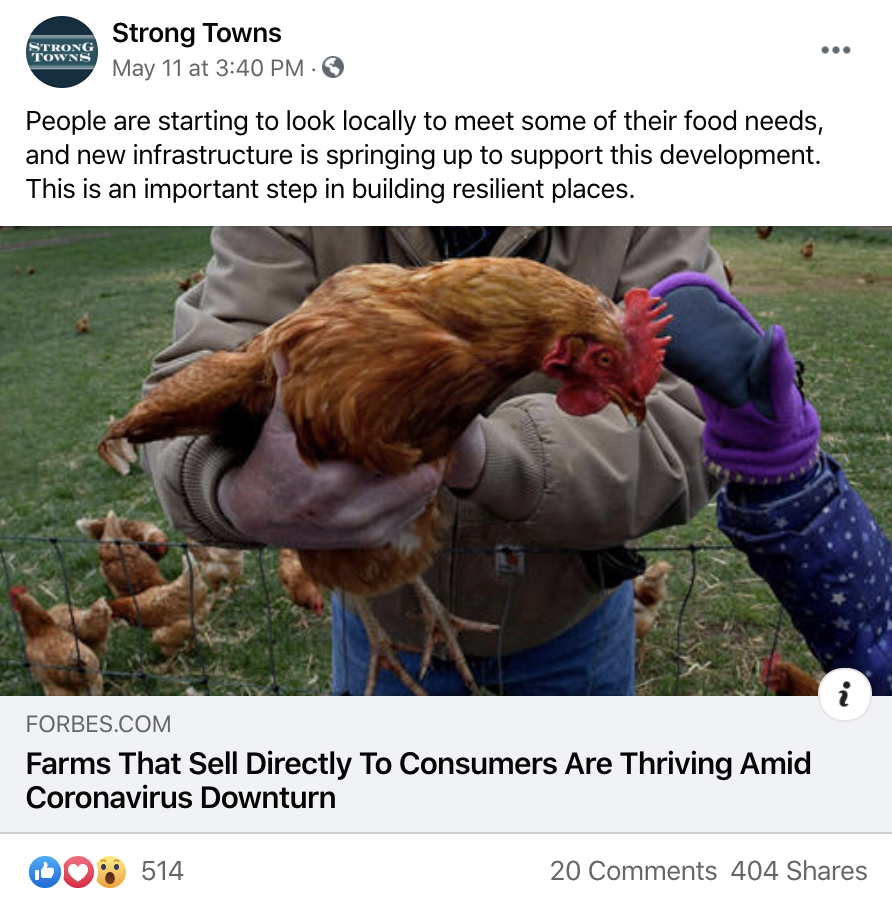Your Voice at Strong Towns: A Weekly Roundup 5/15
Each week, the Strong Towns team puts together some highlights of the great community you have built alongside us. You are doing amazing work, and it really shows in the discussions you’re having on our social media platforms, Community Site, and in your own place. Check out what others like you are doing to make their cities resilient, and join in on the conversation.
This week, 15 people became sustaining members of the Strong Towns Movement!
Roger Barry, Michael Hoffman, Carol Jackson, James Kent, Andrew Kluter, Colin Martin, Robert Meagher, Lewis Nelson, Darren Ottaway, Mark Pan, Deborah Salkind, Charles Saxe, Phil Studenberg, Lynn Walker, and Emma Wendt, thank you for your generosity. Your contribution will help us continue to provide resources to others who are leading their own local, bottom-up revolution.
We loved how people came together over a story about local farms selling directly to consumers during the COVID-19 pandemic.
Through the commenters, we discovered a few great resources for connecting with one’s local farmers.
Local Harvest and FarmMatch are just two tools our community shared to help you find fresh produce, meat, and other products from small farms around the country. But as we saw demonstrated on the thread, you might be able to find what you need just by looking to your neighbors who have already been buying their food from nearby farms and producers.
Strong Towns President Charles Marohn started a dialogue about our national habit of borrowing from the future—and how it’s led us to this point.
You can read the editorial he references here, and join in on the conversation on our Community Page.
Andy Diaz, our Strong Towns Member of the Week, told us about Peoria, Illinois
Andy Diaz is an urban gardener and serial dreamer. He began buying vacant lots in his neighborhood to clean them up and grow fresh produce while spending time with his dad, Rigo. In two years they have grown over 3,000 pounds of produce. In 2019, he purchased a commercial building in the neighborhood and has since dreamt of bigger plans. He launched a famers market, and then an incubator space for commercial businesses. His next dream is to open a commercial kitchen/commissary for food entrepreneurs to launch their own businesses. He enjoys helping others make their dreams come true.
Andy Diaz
Q. If you could snap your fingers and change one thing about your place to make it better, what would it be?
A. I would tear down blighted properties that hold no significant historical value and currently deter others from seeing the community how I see it—as a community where the housing is affordable, neighbors are helpful, and we have amenities like the farmers market, local bakery, and neighborhood restaurants. I relate it to people house hunting for their new home. Sometimes we may walk into a great home but cant see past the gaudy paint, carpets, or decorations. When you are fighting to get people to move into a neighborhood, the many vacant/condemned properties that we have in the neighborhood make it hard to market and sell to transplants that would otherwise see the place as their new home.
Q. Tell us about an amazing way your community has reacted to a problem caused by the coronavirus.
A. The community has rallied around small businesses and locally owned restaurants. A Facebook page was created to highlight the local restaurants, their menu and offerings, and which ones are doing curbside, delivery, etc. While many of our restaurants are finding ways to survive the lack of dine-in customers, you can see the conversations from people in the community who are finding new favorites or trying places that they never visited in the past. I have also seen some people ordering meals for the hospital staff, police and fire departments, and other essential employees, helping generate revenue for these businesses and ensuring they survive the shut-downs that came along with COVID.
Q. Tell us about your Third Place
The Peoria Friendship House
A. My Third Place is the Peoria Friendship House (PFH). Friendship House is a local non-profit that serves my community in multiple ways. First, it serves as a community outreach center. While it isn’t hosting much during the shelter-in-place, it still runs a food pantry for the neighborhood. Each week, they service 45-50 families with supplemental groceries to help survive the week. Living in a neighborhood where the average household income is $30,000, it is a vital link to providing food resources into our community. It also hosts Latino Outreach programs to bridge the cultural divide. The Latino Outreach has senior luncheons, citizenship classes, and does translation services for the community. I am on the board of the organization and come down for our monthly board meetings, talk with the staff and our executive director, and hear about what is going on, getting a pulse of things that I may otherwise be blind to in my life. Most importantly, it’s a special place for me because of the childrens’ programs they operate. My son participates in the childrens’ program, where he keeps busy with sports and activities like their lego league, engineering program, and other STEM-type activities. It is a hub of the community, having been here since the 1950’s, so I like to spend my time here to talk with other parents, staff, and just be part of my community during the year.
Join Andy by becoming part of the Strong Towns Movement as a Sustaining Member today!







